General, Sir John Monash, Personal Files Book 21, 3 October - 24 November 1918 - Part 9
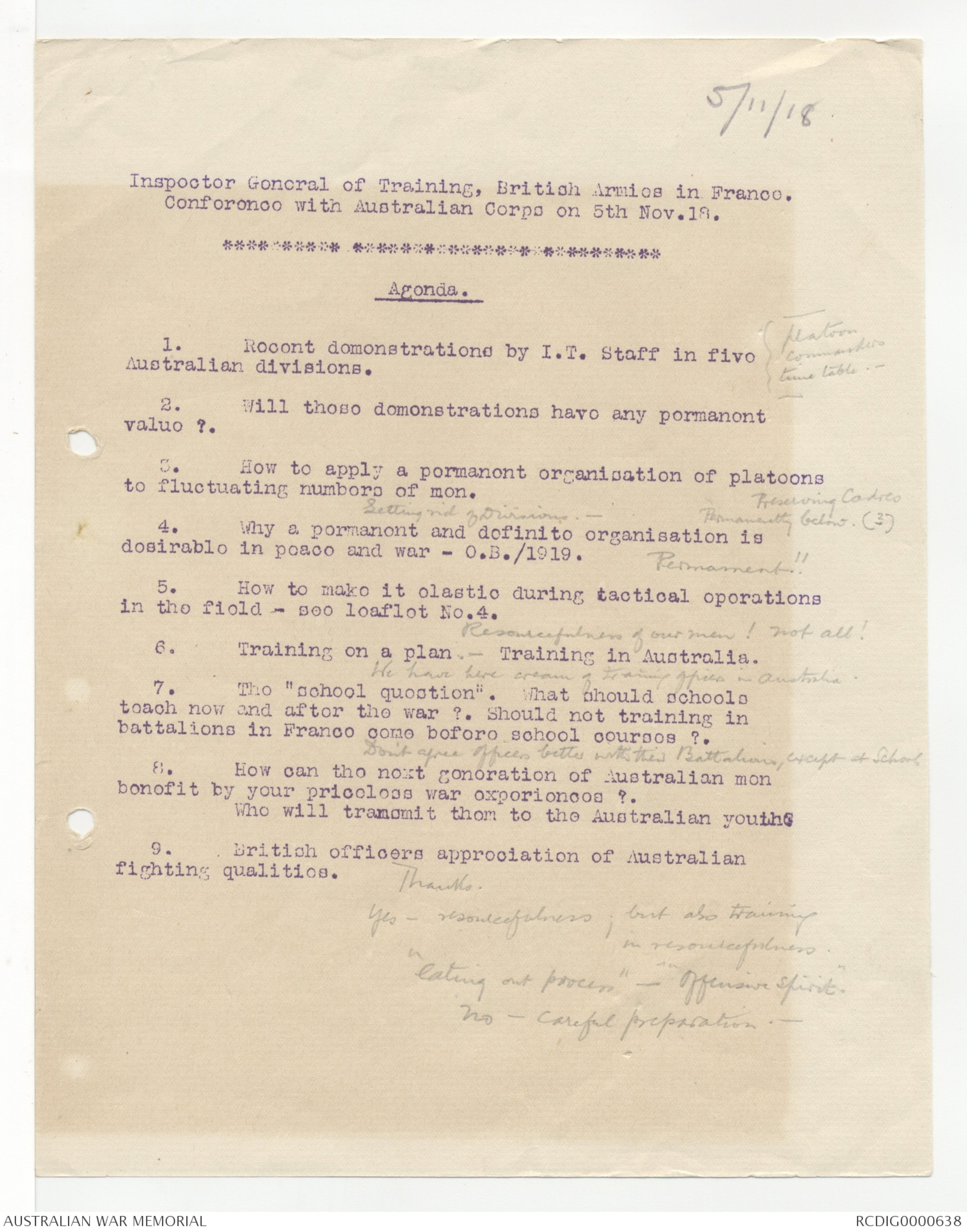
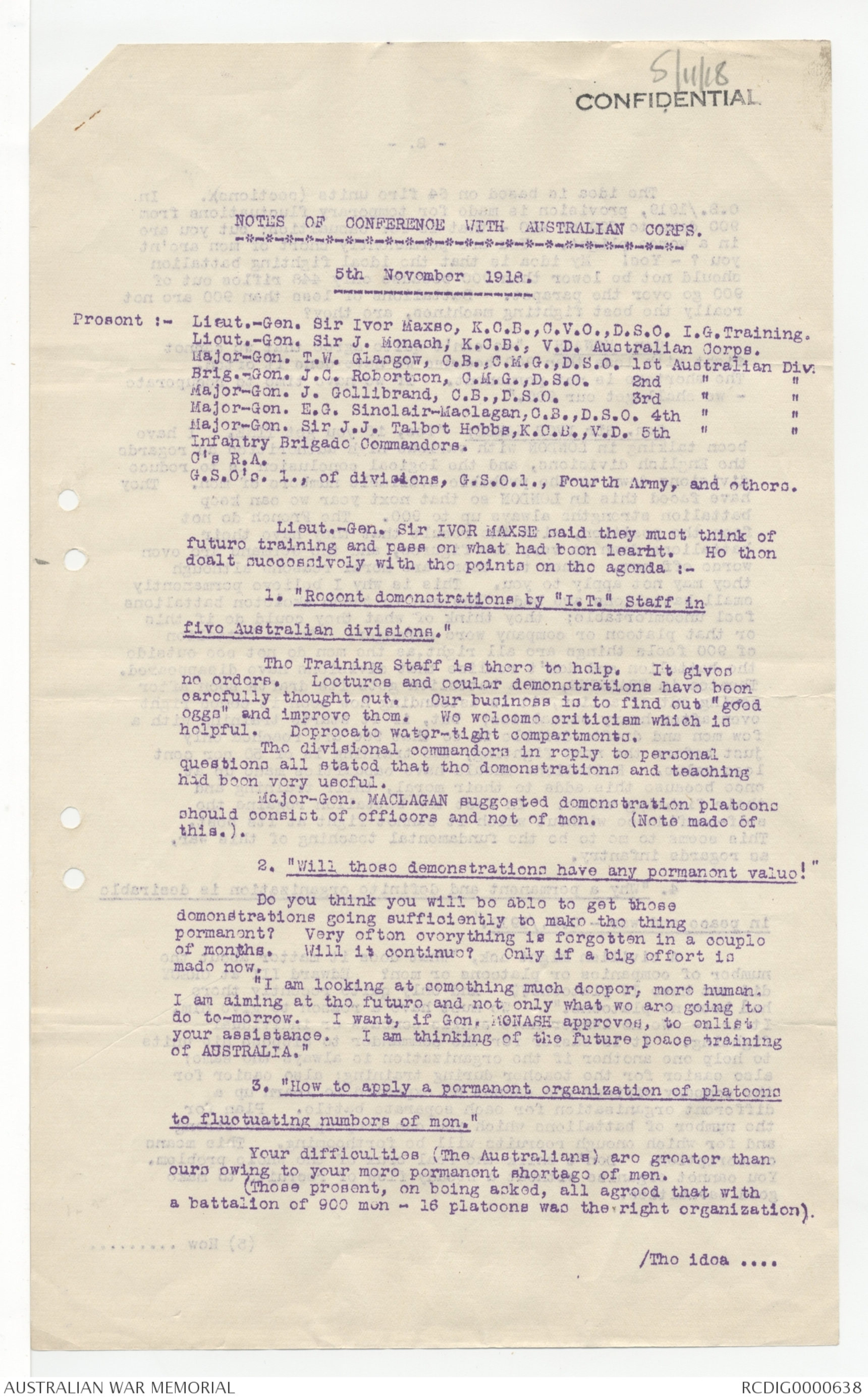

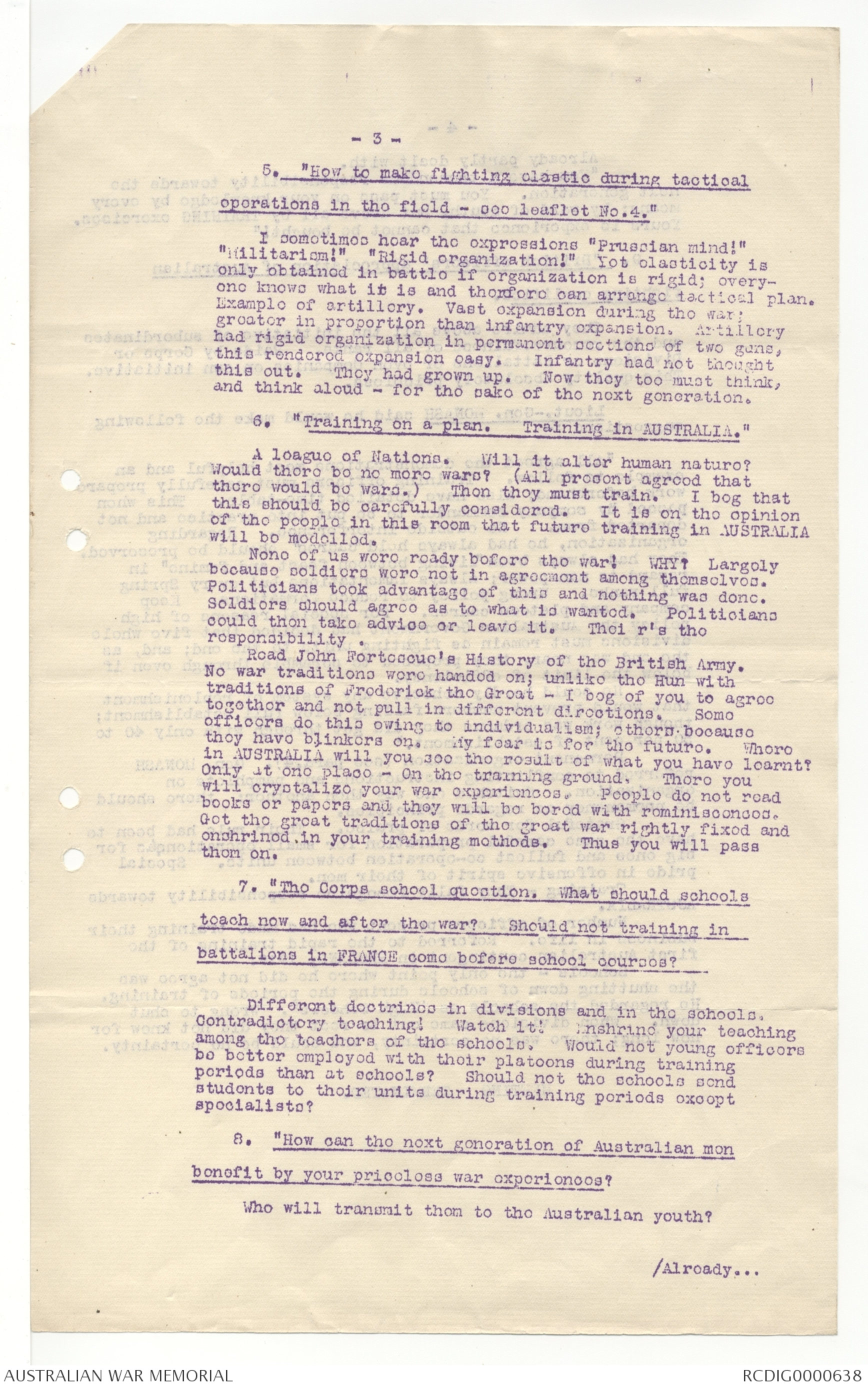
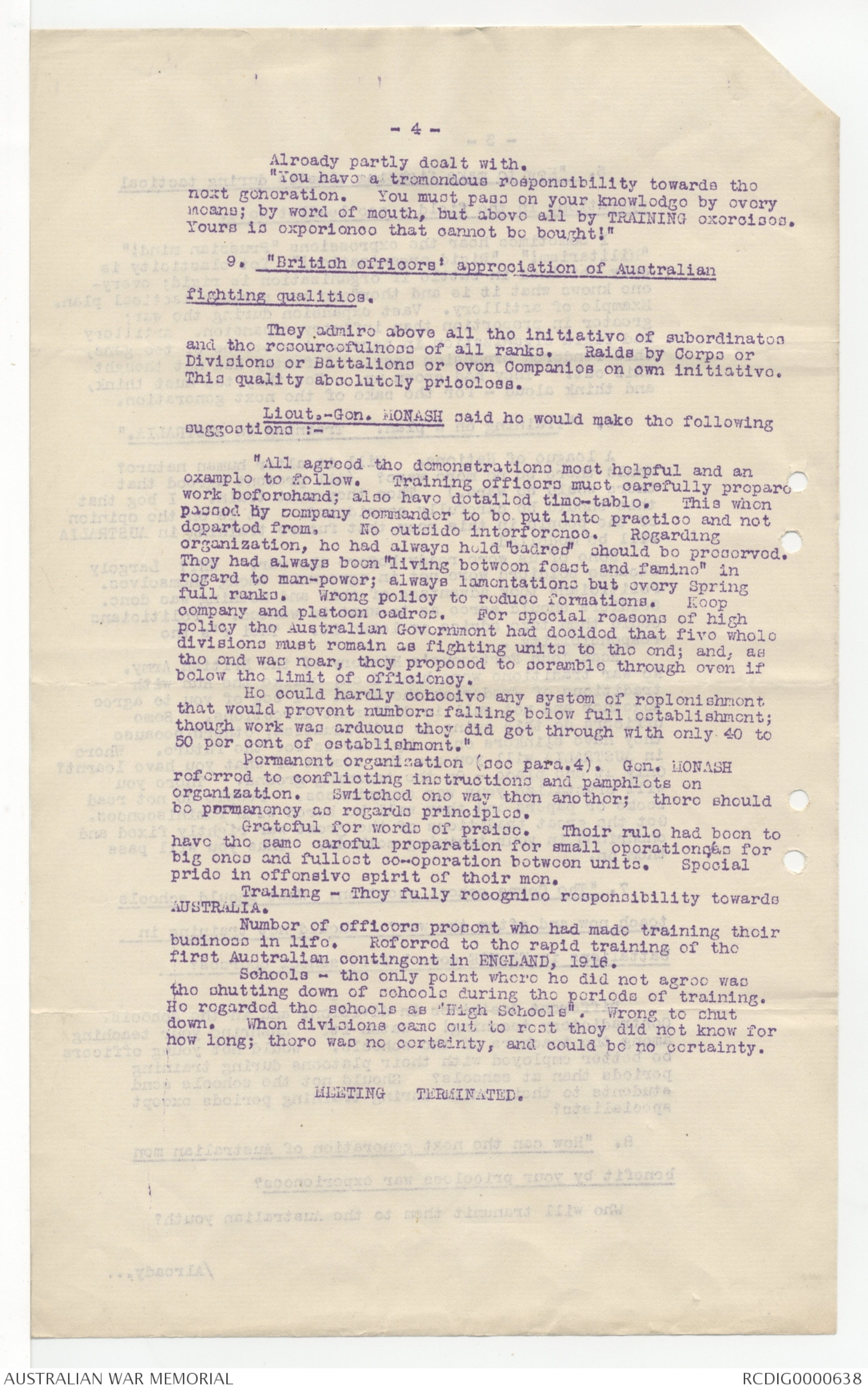
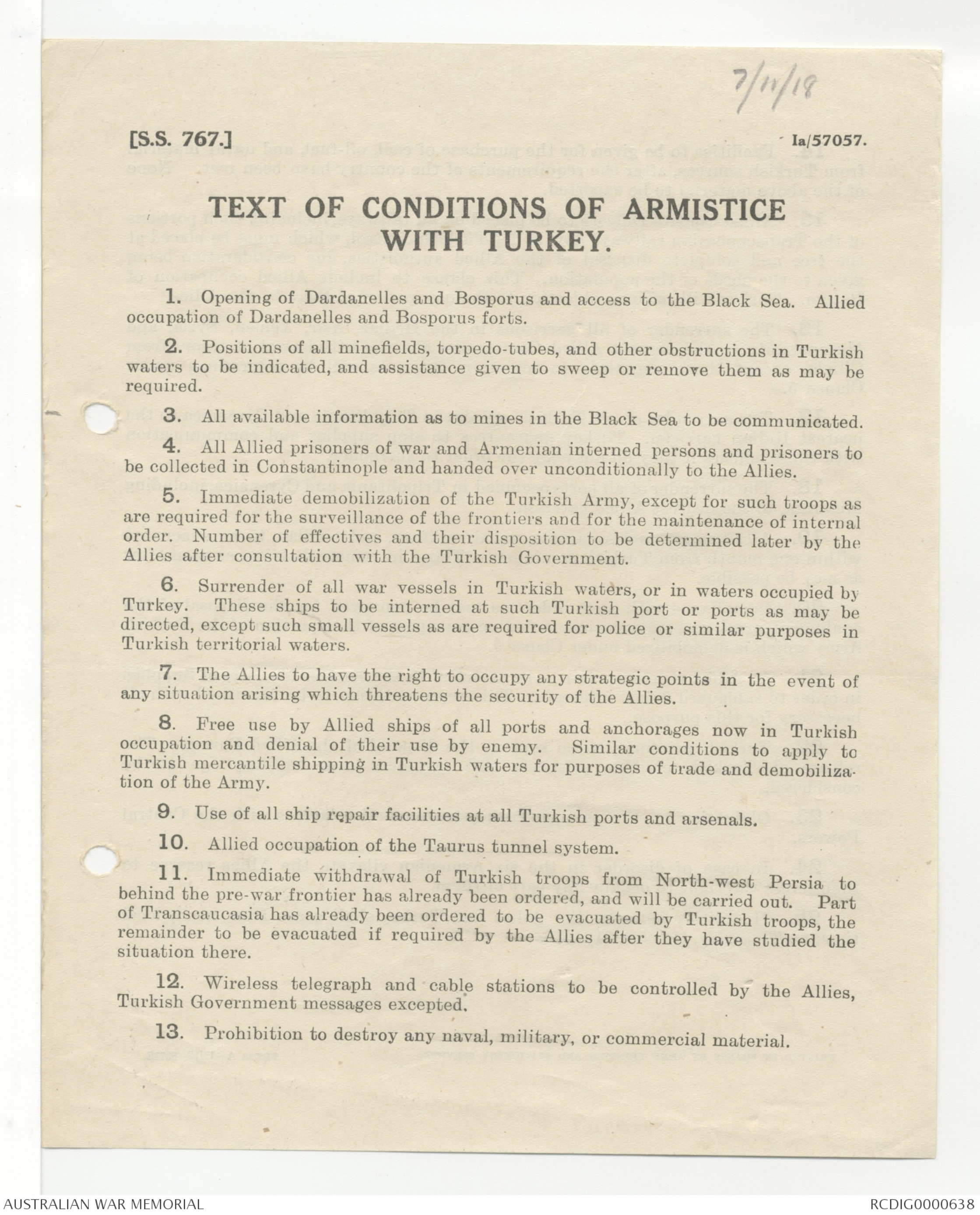
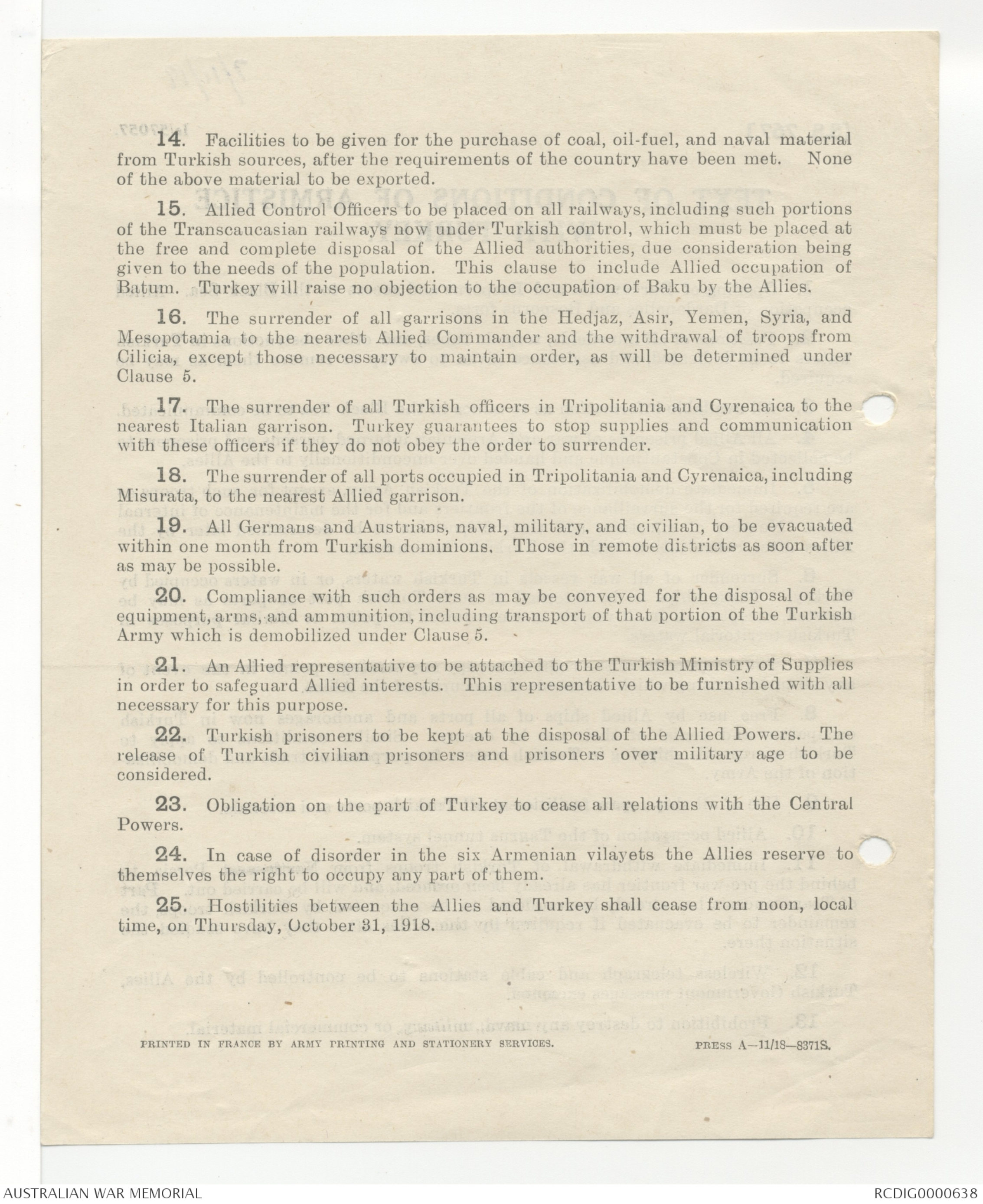


5/11/18
Inspector General of Training, British Armies in France.
Conference with Australian Corps on 5th Nov.18.
Agenda.
1. Recent demonstrations by I.T. Staff in five
Australian divisions.
[*{platoon
{Commanderts
{time table. -
—*]
2. Will those demonstrations have any permanent
value?.
3. How to apply a permanent organisation of platoons
to fluctuating numbers of men.
[* Preserving Cadres
Permanently below. (3)
Setting of Divisions. -*]
4. Why a permanent and definite organisation is
desirable in peace and war - O.B./1919.
[*Permanent!!*]
5. How to make it elastic during tactical operations
in the field - see leaflet No.4.
[*Resourcefulness of our men! Not a;;!*]
6. Training on a plan.- Training in Australia.
[* We had the cream of Training officers in Australia.*]
7. The "school question". What should schools
teach now and after the war?. Should not training in
battalions in France come before, school courses?.
[*Don't agree officers better with their Battalion, except at School.*]
8. How can the next generation of Australian men
benefit by your priceless war experiences?.
Who will transmit them to the Australian youths
9. British officers appreciation of Australian
fighting qualities.
[*Thanks.
Yes - resourcefulness; but also training
in resourcefulness.
"Eating out process" – öffensive spirit."
No – careful preparation.-*]
5/11/18
CONFIDENTIAL
NOTES OF CONFERENOE WITH AUSTRALIAN CORPS.
5th November 1918.
Present: -Lieut.-Gen. Sir Ivor Maxse, K.C.B., C.V.O., D.S.O. I.G. Training.
Lieut.-Gen. Sir J. Monach; K.C.B., V.D. Australian Corps.
Major-Gen. T. W. Glasgow, CB., C.M.G., D.S.O. 1st Australian Div
Brig.-Gen. J. C. Robertson, C.M.G. ,D.S.O0. 2nd " "
Major-Gen. J. Gellibrand, C.B., D.S.O. 3rd " ""
Major-Gen. E. G. Sinclair-Maclagan ,C.B., D.S.O. 4th " "
Major-Gen. Sir J. J. Talbot Hobbs, K.C.S., V.D. 5th " "
Infantry Brigade Commanders.
O's R.A.
G.S.O's. 1., of divisions, G.S.O.1.. Fourth Army, and others.
Lieut.-Gen. Sir IVOR MAXSE said they must think of
future training and pass on what had been learnt. Ho thon
dealt successively with the points on the agenda:-
1. Recent demonstrations by "I.T." Staff in
five Australian divisions."
The Training Staff is there to help. It gives
no orders. Lectures and ocular demonstrations have been
carefully thought cut. Our business is to find out "good
eggs" and improve them We welcome criticism which is
helpful. Deprecate water-tight compartments.
The divisional commanders in reply to personal
questions all stated that the demonstrations and teaching
had been very useful.
Major-Gen. MACLAGAN suggested demonstration platoons
should consist of officers and not of men. (Note made of
this.).
2. "Will these demonstrations have any permanent value!"
Do you think you will be able to get those
demonstrations going sufficiently to mako the thing es
permanent? Very often everything is forgotten in a couple
of months. Will it continue? Only if a big effort is
made now.
"I am looking at something much deeper, more human.
I am aiming at the future and not only what we are going to
do to-morrow. I want, if Gen, MONASH approves, to enlist
your assistance. I am thinking of the future peace training
of AUSTRALIA."
3. "How to apply a permanent organisation of platoons
to fluctuating numbers of men."
Your difficulties (The Australians) are greater than
ours owing to your more permanent shortage of men.
(Those present, on being asked, all agreed that with
a battalion of 900 men - 16 platoons was the right organization).
/The idea ....
- 2. -
The idea is based on 64 fire units (sectionsx). In
O.B./1919, provision is made for temporary fluctuations from
900 down to 500 or 400 - that is for casualties; but you aro
in a worse plight. You aro permanently short of men aren't
you? - Yes. My idea is that the ideal fighting battalion
should not be lower than 900 because only 448 rifles out of
900 go over the parapet. Battalions of less than 900 aro not
really the best fighting machines, are they?
Gen. MONASH; "We can't quit agree that we cannot
fight with less than 900 because we have done it often.
Tho shortage is not permanent. If we have time to recuperate
- we shall get our 900."
Gen. Sir IVOR MAXSE; "Yes, if you got TIME. I have
been talking in LONDON with various high authorities as regards
the Englich divisions, and the logical conclusion is to reduce
divisions down to the probable available numbers of men. They
have faced this in LONDON so that next year we can keep
battalion strengths always up to 900. Tho French do not
face the position, with the result that they have their
battalions down to very low figures, and the Germans aro even
worse off now. Then too there are moral reasons although
they may not apply to you. This is why I believe permanently
small battalions are bad:- tThe men in these skeleton battalions
feel uncomfortable; they think of what they could do if this
or that platoon or company were stronger. But a battalion
of 900 feels things are all right, as the men do not see outside
the battalion and don't realise that divisions have disappeared.
Then too in TRAINING, if a battalion gets its drafts soon after
coming out of action, it is astounding how soon it comes right
even after heavy casualties; but, if it starts training with a
few men and drafts dribble in so that 900 are reached only
just before the next fighting, the training is of 50 per cent
less value. Battalions should have casualties made up at
once because this adds to their moral, their training and
their fighting value. In fact the battalion regains the
self-confidence without which it cannot fight at its best.
This seems to me to be the fundamental teaching of this war,
as regards infantry.
4. "Why a permanent and definite organization is desirable
in peace and war -O.B./1919."
A civilian might ask, "What does it matter about the
number of companies or platoons or men? Edward III at CRECY
did not have 16 platoonsYY And only quite recently there
had been no platoons." We must have a reason to give him.
It is:- We no longer have single combats or individual
fighting. It is easier for the commander to dispose his units
to help one another if the organization is always the same;
also easier for the teacher during training; also easier for
the company officer who cannot be expected to learn up a
different organisation for each separate battle. Plan for
the number of battalions which you can keep up to 900 strong
and for which enough recruits will be forthcoming. This means
conscription. Don't shirk the real crux of the whole problem.
You cannot organise without a steady flow of recruits to make
good casualties.
(5) How .........
- 3 -
5. "How to make fighting elastic during tactical
operations in the field - ooo leaflet No.4."
I sometimes hear the expressions "Prussian mind!"
"Militarism!" "Rigid organization!" Yet elasticity is
only obtained in battle if organization is rigid; everyone
knows what it is and therefore can arrange tactical plan.
Example of artillery. Vast expansion during tho war:
greater in proportion than infantry expansion. Artillery
had rigid organization in permanent sections of two guns,
this rendered expansion easy. Infantry had not thought
this out. They had grown up. Now they too must think,
and think aloud - for the sake of the next generation.
6. "Training on a plan." "Training in AUSTRALIA."
A league of Nations. Will it alter human nature?
Would there be no more wars? (All present agreed that
there would be wars.) Then they must train. I beg that
this should be carefully considered. It is on the opinion
of the people in this room that future training in AUSTRALIA
will be modelled.
None of us were ready before the war! Why? Largely
because soldiers were not in agreement among themselves.
Politicians took advantage of this and nothing was done.
Soldiers should agree as to what is wanted. Politicians
could then take advice or leave it. Their's the
responsibility
Read John Fortescue's History of the British Army.
No war traditions were handed on; unlike the Hun with
traditions of Frederick the Great - I beg of you to agree
together and not pull in different directions. Some
officers do this owing to individualism; others because
they have blinkers on. My fear is for the future. Where
in AUSTRALIA will you see the result of what you have learnt?
Only at oneplace - On the training ground. There you
will crystalize your war experiences. People do not read
books or papers and they will be bored with reminiscences.
Got the great traditions of the great war rightly fixed and
enshrined in your training methods. Thus you will pass
them on.
7. "The Corps school question. What should schools
teach now and after the war? Should not training in
battalions in France come before school courses?
Different doctrines in divisions and in the schools.
Contradictory teaching! Watch it! Enshrine your teaching
among the teachers of the schools. Would not young officers
be better employed with their platoons during training
periods than at schools? Should not the schools send
students to their units during training periods except
specialists?
8. "How can the next generation of Australian men
benefit by your priceless war experiences?
Who will transmit them to the Australian youth?
/Already..
- 4 -
Already partly dealt with.
"You have a tremendous responsibility towards the
next generation. You must pass on your knowledge by every
means; by word of mouth, but above all by TRAINING exercises.
Yours is experience that cannot be bought!"
9. "British officers' appreciation of Australian
fighting qualities.
They admire above all the initiative of subordinates
and the resourcefulness of all ranks. Raids by Corps or
Divisions or Battalions or even Companies on own initiative.
This quality absolutely priceless.
Liout.-Gen. MONASH said he would make the following
suggestions:
"All agreed the demonstrations most helpful and an
example to follow. Training offices must carefully prepare
work beforehand; also have detailed time-table. This when
passed by company commander to be put into practice and not
departed from. No outside interference. Regarding
organization, he had always held "badred", should be preserved.
They had always been "living between feast and famine" in
regard to man-power; always lamentations but every Spring
full ranks. Wrong policy to reduce formations. Keep
company and platoon cadres. For special reasons of high
policy the Australian Government had decided that five whole
divisions must remain as fighting units to the end; and, as
the end was near, they proposed to scramble through even if
below the limit of efficiency.
He could hardly cohnceive any system of replenishment
that would prevent numbers falling below full establishment;
though work was arduous they did got through with only 40 to
50 per cent of establishment."
Permanant organization (see para.4). Gen. MONASH
referred to conflicting instructions and pamphlets on
organization. Switched ono way then another; ther should
be permanency as regards principles.
Grateful for words of praise. Their rule had been to
have the same careful preparation for small operations for
big ones and fullest co-operation between units. Special
pride in offensive spirit of their men.
Training - They fully recognise responsibility towards
AUSTRALIA.
Number of officers present who had made training their
business in life. Referred to the rapid training of the
first Australian contingent in ENGLAND, 1916.
Schools - the only point where he did not agree was
the shutting down of schools during the periods of training.
He regarded the schools as "High Schools". Wrong to shut
down. When divisions came out to rest they did not know for
how long; there was no certainty, and could be no certainty.
MEETING
TERMINATED.
7/1/18*]*[*
[SS. 767.]
1a/57057.
TEXT OF CONDITIONS OF ARMISTICE
WITH TURKEY
1. Opening of Dardanelles and Bosporus and access to the Black Sea. Allied
occupation of Dardanelles and Bosporus forts.
2. Positions of all minefields, torpedo-tubes, and other obstructions in Turkish
waters to be indicated, and assistance given to sweep or remove them as may be
required.
3. All available information as to mines in the Black Sea to be communicated.
4. All Allied prisoners of war and Armenian interned persons and prisoners to
be collected in Constantinople and handed over unconditionally to the Allies.
5. Immediate demobilization of the Turkish Army, except for such troops as
are required for the surveillance of the frontiers and for the maintenance of internal
order. Number of effectives and their disposition to be determined later by the
Allies after consultation with the Turkish Government.
6. Surrender of all war vessels in Turkish waters, or in waters occupied by
Turkey. These ships to be interned at such Turkish port or ports as may be
directed, except such small vessels as are required for police or similar purposes in
Turkish territorial waters
7. The Allies to have the right to occupy any strategic points in the event of
any situation arising which threatens the security of the Allies.
8. Free use by Allied ships of all ports and anchorages now in Turkish
occupation and denial of their use by enemy. Similar conditions to apply to
Turkish mercantile shipping in Turkish waters for purposes of trade and demobilization
of the Army.
9. Use of all ship repair facilities at all Turkish ports and arsenals.
10. Allied occupation of the Taurus tunnel system.
11. Immediate withdrawal of Turkish troops from North-west Persia to
behind the pre-war frontier has already been ordered, and will be carried out. Part
of Transcaucasia has already been ordered to be evacuated by Turkish troops, the
remainder to be evacuated if required by the Allies after they have studied the
situation there.
12. Wireless telegraph and cable stations to be controlled by the Allies,
Turkish Government messages excepted.
18. Prohibition to destroy any naval, military, or commercial material.
14. Facilities to be given for the purchase of coal, oil fuel, and naval material
from Turkish sources, after the requirements of the country have been met. None
of the above material to be exported.
15. Allied Control officers to be placed on all railways, including such portions
of the Transcaucasian railways now under Turkish control, which must be placed at
the free and complete disposal of the Allied authorities, due consideration being
given to the needs of the population. This clause to include Allied occupation of
Batum. Turkey will raise no objection to the occupation of Baku by the Allies.
16. The surrender of all garrisons in the Hedjaz, Asir, Yemen, Syria, and
Mesopotamia to the nearest Allied Commander and the withdrawal of troops from
Cilicia, except those necessary to maintain order, as will be determined under
Clause 5.
17. The surrender of all Turkish oficers in Tripolitania and Cyrenaica to the
nearest Italian garrison. Turkey guarantees to stop supplies and commuunication
with these officers if they do not obey the order to surrender.
18. The surrender of all ports occupied in Tripolitania and Cyrenaica, including
Misurata, to the nearest Allied garrison.
19. All Germans and Austrians, naval, military, and civilian, to be evacuated
within one month from Turkish dominions. Those in remote districts as soon after
as may be possible.
20. Compliance with such orders as may be conveyed for the disposal of the
equipment, arms, and ammunition, including transport of that portion of the Turkish
Army which is demobilized under Clause 5.
21. An Allied representative to be attached to the Turkish Ministry of Supplies
in order to safeguard Allied interests. This representative to be furnished with all
necessary for this purpose.
22. Turkish prisoners to be kept at the disposal of the Allied Powers. The
release of Turkish civilian prisoners and prisoners over nuilitary age to be
considered.
23. Obligation on the part of Turkey to cease all relations with the Central
Powers.
24. In case of disorder in the six Armenian vilayets the Allies reserve to
themselves the right to occupy any part of them.
25. Hostilities between the Allies and Turkey shall cease from noon, local
time, on Thursday, October 31, 1918.
[*7/11/18*]
[SS. 768.] 1a/
TERMS OF THE ARMISTICE CONCLUDED BY THE
ALLIED POWERS AND THE UNITED STATES
WITH AUSTRIA-HUNGARY.
I.- MILITARYCLAUSES.
1. The immediate cessation of hostilities by land, sea and air.
2. Total demobilization of the Austro-Hungarian Army, and immediate withdrawal
of all Austro-Hungarian forces operating on the front from the North Sea to Switzerland.
Within Austro-Hungarian territory, limited as in Clause 3 below, there shall only be
maintained as an organized military force a maximum of 20 Divisions, reduced to prewar
peace effectives.
Half the Divisional, Corps, and Army artillery and equipment shall be collected at
points to be indicated by the Allies and United States of America for delivery to them
beginning with all such material as exists intheterritories tobe evacuated bythe Austro-
Hungarian forces.
3. Evacuation of all territories invaded by Austria-Hungary since the beginning
of war. Withdrawal within such periods as shall be determined by the Commander-in-
Chief of the Allied forces on each front of the Austro-Hungarian Armies behind a line
fixed as follows:—
From Piz Umbrail to the north of the Stelvio it will follow the crest of the
Rhetian Alps up to the sources of the Adige and the Eisach, passing thence by
Mounts Reschen and Brenner and the heights of Oetz and Ziller; the lne thence
turns south, crossing Mount Toblach, and meeting the present frontier of the Carnic
Alps. It follows this frontier up to Mount Tarvis, and after Mount Tarvis the watershed
of the Julian Alps by the Col of Predil, Mount Mangart, the Tricorno (Terglou),
and the watershed of the Cols di Podberdo, Podlaniscam, and Idria. From this
point the line turns south east towards the Schneeberg, excluding the whole basin of
the Save and its tributaries; from the Schneeberg it goes down towards the coast in
such a way as to include Castua, Mattuglia, and Volosca in the evacuated territories.
It will also follow the administrative limits of the present province of Dalmatia,
including to the north Licarica and Trivania, and to the south territory Himnited by a
line from the shore of Cape Planca to the summits of the watershed eastwards, so
as to include in the evacuated area all the valleys and watercourses flowing towards
Sebenico, such as the Cicola, Kerka, Butisnica, and their tributaries. It will also
include all the islands in the north and west of Dalmatia, from Premuda, Selve
Ulbo, Scherda, Maon, Pago, and Puntadura in the north up to Meleda in the south.
embracing Sant'Andrea, Busi, Lissa, Lesina, Tercola, Curzola, Cazza, and Lagosta,
as well as the neighbouring rocks and islets and Pelagosa, only excepting the islands
of Great and Small Zirona, Bua, Solta, and Brazza.
All territories thus evacuated will be occupied by the troops of the Allies and of
the United States of America.
All military and railway equipment of all kinds (including coal), belonging to or
within these territories, to be left in situ and surrendered to the Allies according to special
orders given by the Commanders-in-Chief of the forces of the Associated Powers on the
different fronts. No new destruction, pillage, or requisition to be done by enemy troops
in the territories to be evacuated by them and occupied by the forces of the Associated
Powers.
4. The Allies shall have the right of free movement over all road and rail and waterways
in Austro-Hungarian territory and of the use of the necessary Austrian and
Hungarian means of transportation.
The Armies of the Associated Powers shall occupy such strategic points in Austria-Hungary
at such times as they may deem necessary to enable them to conduct military
operations or to maintain order.
They shall have the right of requisition on payment for the troops of the Associated
Powers wherever they may be.
5. Complete evacuation of all German troops within 15 days, not only from the
Italian and Balkan fronts, but from all Austro-Hungarian territory
Internment of all German troops which have not left Austria-Hungary within that
date.
6. The administration of the evacuated territories of Austria-Hungary will be
entrusted to the local authorities under the control of the Allied and Associated Armies
of occupation.
7. The immediate repatriation without reciprocity of all Allied prisoners of war
and interned subjects, and of civil populations evacuated from their homes, on conditions
to be laid down by the Commanders in-Chief of the forces of the Associated Powers on
the various fronts.
8. Sick and wounded who cannot be removed from evacuated territory will be
cared for by Austro-Hungarian personnel, who will be left on the spot with the medical
material required.
II- NAVAL CONDITIONS.
1. Immediate cessation of all hostilities at sea, and definite information to be given
as to the location and movements of all Austro-Hungarian ships.
Notification to be made to neutrals that freedom of navigation in all territorial waters
is given to the naval and mercantile marines of the Allied and Associated Powers, all
questions of neutrality being waived.
2. Surender to the Allies and United States of America of 15 Austro-Hungarians
submarines, completed between the years 1910 and 1918, and of all German submarines
which are in or may hereafter enter Austro-Hungarian territorial waters All other
Austro-Hungarian submarines to be paid off and completely disarmed, and to remain
under the supervision of the Allies and United States of America.
3. Surrender to the Allies and United States of America, with their complete
armament and equipment, of:-
Three battleships,
Three Light cruisers.
Nine destroyers,
Twelve torpedo-boats,
One minelayer,
Six Danube monitors,
to be designated by the Allies and the United States of America. All other surface warships
(including river craft) are to be concentrated in Austro-Hungarian naval bases to
be designated by the Allies and the United States of America, and are to be paid off and
completely disarmed and placed under the supervision of the Allies and United States
of America.
4. Freedom of navigation to al warships and merchant ships of the Allied and
Associated Powers to be given in the Adriatic and up the River Danube and its tributaries
in the territorial waters and territory of Austria-Hungary.
The Allies and Associated Powers shall have the right to sweep up all minefields and
obstructions, and the positions of these are to be indicated.
In order to ensure the freedom of navigation on the Danube, the Allies and the United
States of America shall be empowered to occupy or to dismantle all fornications or
defence works.
5. The existing blockade conditions set up by the Allied and Associated Powers
are to remain unchanged, and all Austro-Hungarian merchant ships found at sea are to
remain liable to capture, save exceptions which may be made by a Commission nominated
by the Allies and United States of America.
6. All naval aircraft are to be concentrated and immobilized in Austro-Hungarian
bases to be designated by the Allies and United States of America.
7. Evacuation of all the Italian coasts and of all ports occupied by Austria-Hungary
outside their national territory, and the abandonment of all floating craft, naval materials,
equipment and materials for inland navigation of all kinds.
8. Occupation by the Allies and the United States of America of the land and sea
fortifications and the islands which form the defences and of the dockyards and arsenal
at Pola.
9. All merchant vessels held by Austria-Hungary belonging to the Allies and
Associated Powers to be returned.
10. No destruction of ships or of materials to be permitted before evacuation, surrender,
or restoration.
11. All naval and mercantile marine prisoners of war of the Allied and Associated
Powers in Austro-Hungarian hands to be returned without reciprocity.
 Sam scott
Sam scottThis transcription item is now locked to you for editing. To release the lock either Save your changes or Cancel.
This lock will be automatically released after 60 minutes of inactivity.